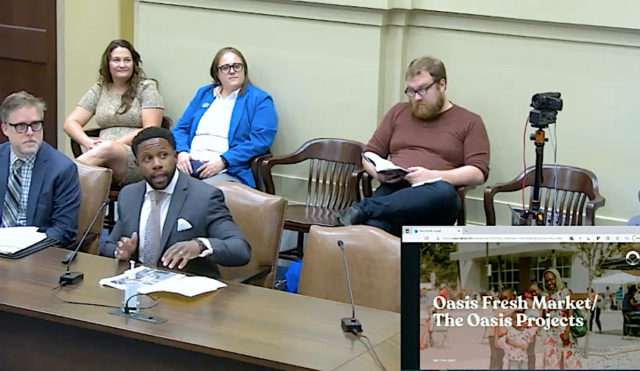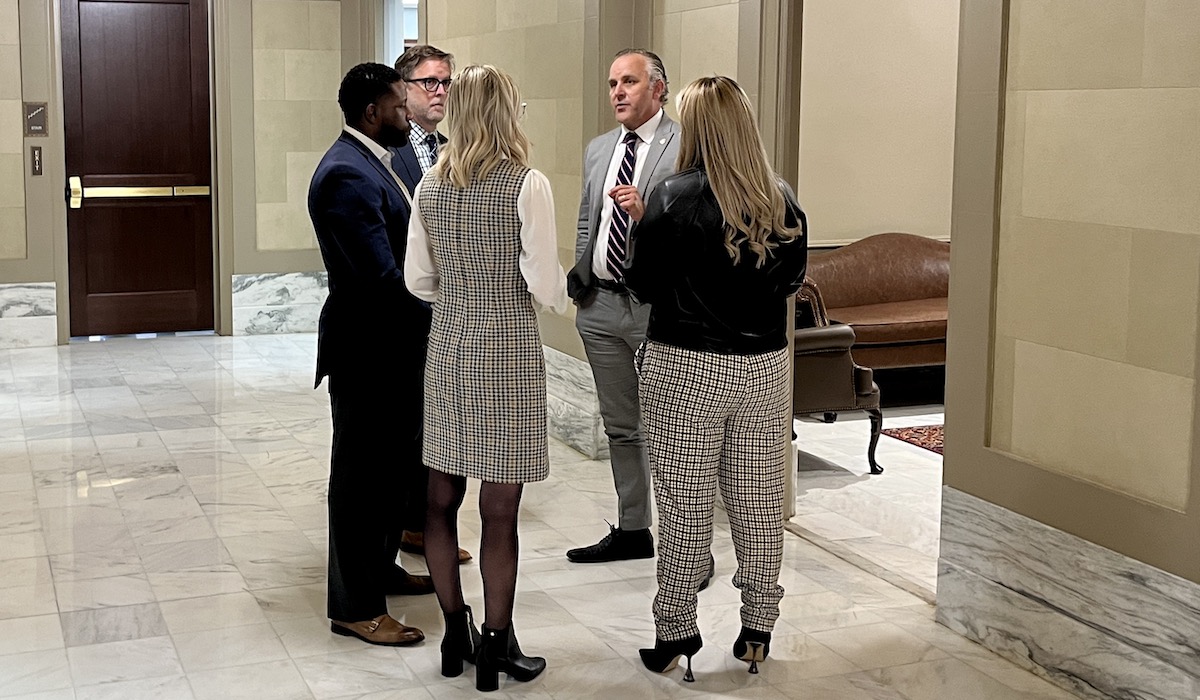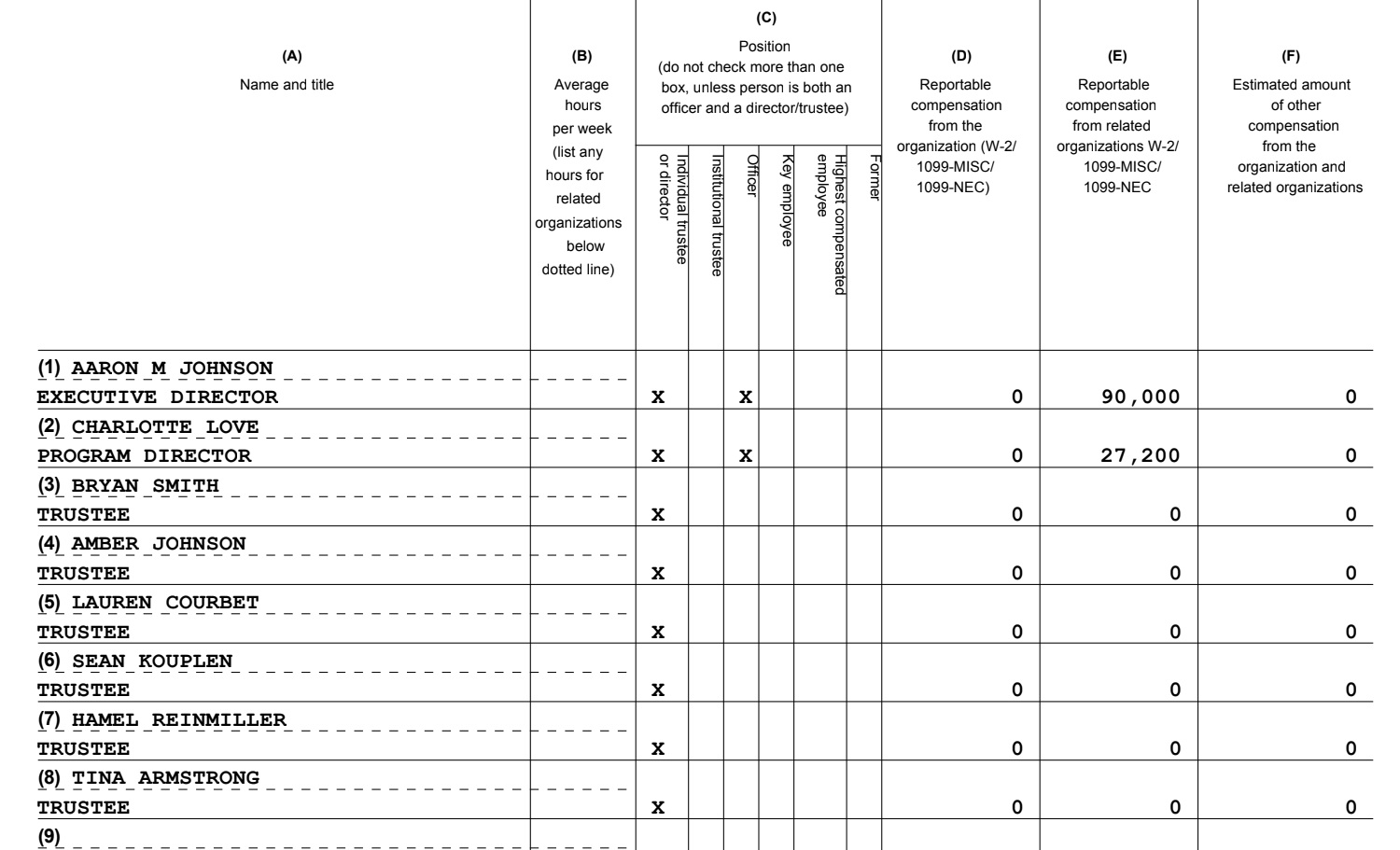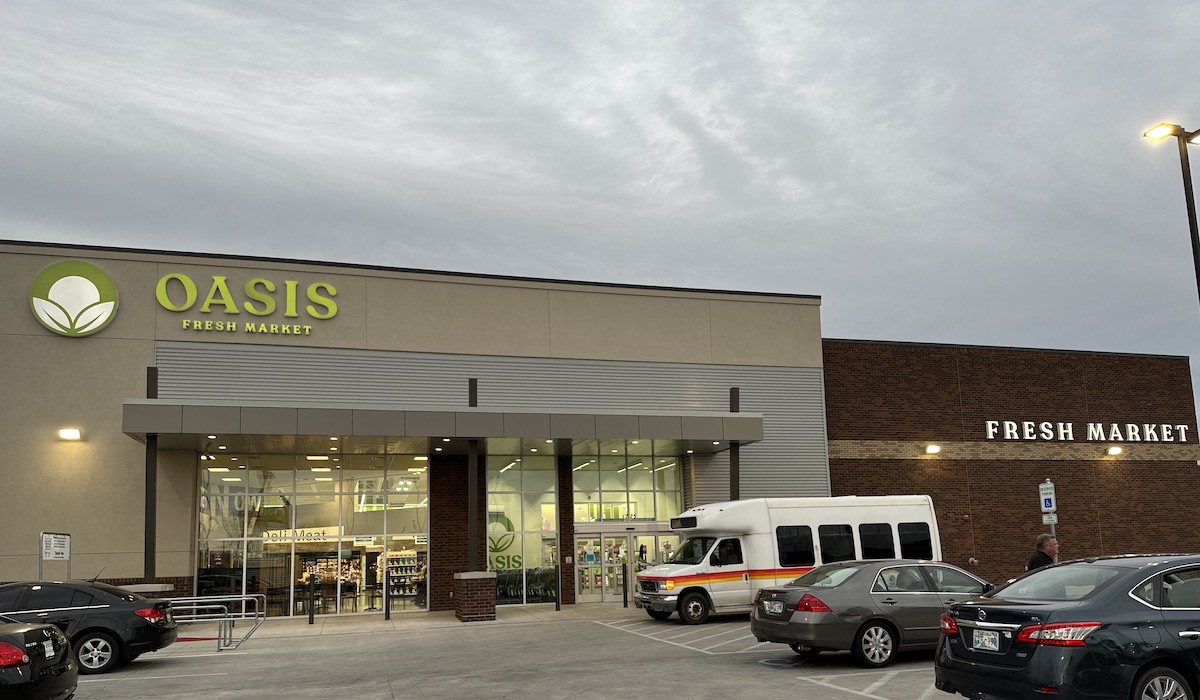

A proposal to provide a nonprofit organization $30 million of federal American Rescue Plan Act funding to build four grocery stores in underserved areas is receiving additional review by Oklahoma legislators owing to questions about the nonprofit’s governance board, the executive director’s stake in for-profit companies potentially associated with operation of the planned stores, and ongoing litigation filed by a former business partner.
Aaron “AJ” Johnson is the co-owner and executive director of Oasis Fresh Market, a privately owned grocery store that opened in a north Tulsa food desert in May 2021. Simultaneously, Johnson serves as the executive director of Oasis Fresh Foundation, a 501(c)(3) nonprofit also established in 2021 to provide wrap-around social services for customers.
But although Johnson has the conceptual support of many influential Oklahomans, uncertainty about the governance structure of Oasis Fresh Foundation has raised significant questions about whether the organization is positioned to handle $30 million of public money. During a series of interviews with NonDoc, for example, Johnson has provided conflicting information about the makeup of his nonprofit’s governing board.
The foundation’s 990 IRS tax form for 2021 lists Aaron Johnson and his wife, Amber, as board members. On Friday, Johnson defended his wife’s position as an active board member. But on Sunday, he said she had only been on the board for six months and had left the board prior to 2022.
Similarly, Oklahoma Center for Nonprofits Vice President Lauren Corbut and her fiancé, petroleum company executive Hamel Reinmiller, were listed as board members on the Oasis Fresh Foundation 2021 tax filing. But reached Sunday, both Corbut and Reinmiller said they were caught off guard when Johnson announced them as board members at a May 2022 event.
“AJ is a friend, and Hamel and I both support the work he’s doing, but neither of us have ever acted in an official member-governance capacity,” Corbut said. “We have never attended a board meeting, nor have we ever signed a duty of care or loyalty or transparency.”
Corbut said she was unaware that she and Reinmiller were listed on the 2021 tax form, and Reinmiller said he reached out in October with questions about the situation.
“I expressed some concerns about this and kind of just said, ‘If we’re on it, we need to step back, and if we’re not, then great,'” Reimiller said. “It’s reasonable that he thought up until that point that we were supporters of his, and we remain supporters of what he is trying to do. But if he’s going to receive $30 million of public money, there have got to be some best practices put in place.”
Johnson has made other conflicting statements about his nonprofit’s governing board as well.
Asked Friday to identify the chairperson of the board, Johnson said he would consult his accountant and provide an answer over the weekend. Asked again by email Sunday, Johnson identified former Homeland CEO Marc Jones as board chairman of the Oasis Fresh Foundation. But four hours earlier, when asked on the phone whether Jones was a board member or a contracted employee, Johnson replied, “Marc is a partner consultant.”
‘Empower and transform lives and individuals’

An affable and outgoing man who spent eight years as a pastor at Victory Christian Church, Johnson worked from 2017 to 2021 as executive director of the Tulsa Dream Center, a nonprofit organization started by Victory Christian leadership to provide a variety of social services and economic empowerment opportunities. In April 2021, he left those roles to lead the Oasis projects full time and to open the first new grocery store in a historically Black north Tulsa neighborhood in 14 years.
The 2021 IRS filing notes that Aaron Johnson received no compensation for running Oasis Fresh Foundation, but it lists $90,000 in compensation “from related entities” like Oasis Fresh Market.
The IRS form also indicates that the nonprofit paid $27,238 for “contract services” to DreamCo, a “consulting and marketing” business registered at the address of the Johnsons’ home in Bixby.
Total 2021 revenue for Oasis Fresh Foundation was reported as $284,658, and the nonprofit’s purpose is to establish “a harmonious relationship with the local minority community by assisting those in need through benevolence giving and the distribution of gift cards for food given directly to those in need,” according to the tax filing.
“With us going into low-income, low-access areas — man, someone getting an apple is great,” Johnson told NonDoc in September regarding the relationship between his for-profit company and nonprofit organization. “But if they can get an apple and financial literacy at the same time, that’s empowerment. And so our goal is really to empower and transform lives and individuals, and thus communities.”
During their September special session to appropriate ARPA dollars, lawmakers had anticipated approving Johnson’s application, which would have dispersed $30 million to the Oasis Fresh Foundation via contract with the Department of Human Services. However, an unrelated dispute between the House and Senate regarding funding for domestic violence centers derailed the DHS appropriation bill.
Legislative budget leaders again seemed prepared to move the bill forward last week in an effort to address food insecurity issues in lower-income communities. Grocery businesses typically operate on small profit margins, with high capital investment costs and volatile food prices hindering development efforts in poorer areas.
But lingering concerns from some lawmakers and nonprofit leaders — as well as questions from NonDoc about the overlapping business entities and Oasis Fresh Foundation’s governance — resulted in additional discussions about the proposal.
On Friday, Senate Appropriations and Budget Vice Chairman Chuck Hall (R-Perry) said members of the Legislature’s ARPA committee held an informal meeting to discuss new questions raised by a review of Oasis Fresh Foundation’s 990 tax filing, which had not been required of Johnson or other nonprofits during the ARPA application process.
“It is incumbent of those of us in the ARPA process to vet out the legitimacy of any operation prior to funding a request, and if we determine through additional research and study that there could potentially be questions on the flow of funds, then we are going to take a step back,” Hall said. “Our committee has requested and has received documentation that is required in any steps to verify the legitimacy of any nonprofit, and we are going to take our time to evaluate those to see that they are complete and that we have a comfort level with filings that are appropriate with any nonprofit.”
Ginny Bass Carl, a prominent nonprofit consultant who said she has been impressed by Johnson and the Oasis Fresh Foundation during her management of the unrelated Community CARES Partners initiative, said a robust governing board is key to the success of any nonprofit, and she questioned why legislators are only now reviewing the foundation’s Form 990 and its board oversight.
“It’s funny, isn’t it? It’s taken this long to get this money out, but they didn’t ask a lot of what we would think would be obvious questions. Like, ‘Hey, can I see your 990? Can everyone here attach your 990 to this proposal? Can everyone here attach your board of directors?'” she said. “You would think that they would have done that. So it’s like, what took you so long if you weren’t doing that kind of stuff?”
Form 990 notes ‘contract services’ with Aaron Johnson

Unlike most major nonprofit organizations, Oasis Fresh Foundation has not maintained an active GuideStar profile, a fact that caught the attention of prominent Oklahoma nonprofit leaders after legislators revealed in September that the organization was set to receive $30 million of ARPA money. Typically, organizations post their 990 IRS filings and other information on their GuideStar pages, which are rewarded with bronze, silver or gold levels of transparency. (The Oasis Fresh Foundation does not have its own website, and its board is not listed on the Oasis Fresh Market website.)
Nonprofit 501(c)(3) organizations file 990 tax forms annually and are required to provide them to the public upon request. NonDoc originally asked to review Oasis Fresh Foundation’s 990 filing in September and again in October, at which point Johnson said “a request has been submitted.”
Asked again about access to Oasis Fresh Foundation’s Form 990 on Feb. 14, Johnson claimed his attorney had emailed it. No such email was received, and another request was made for review.
On Feb. 20, hours after NonDoc asked legislators about the situation, Johnson emailed a 990 document that was unsigned and undated by the listed tax preparer. The form’s Schedule B list of revenue sources was withheld, as allowed by federal law.
Johnson said his nonprofit’s 990 had not been requested previously by the state during the ARPA application process and that it had not been finalized until after Oct. 26.
“I didn’t even have it at that time,” Johnson said.
On the form, the Oasis Fresh Foundation, which Johnson refers to as “Oasis projects,” describes its mission as “community transformation and humanitarian services.” The filing includes an explanation for the relationship between the nonprofit Oasis Fresh Foundation and the for-profit Oasis Fresh Market:
Oasis Fresh Foundation is a 501(c)(3) organization related to Oasis Fresh Market via its executive director Aaron Johnson, who is a partner of Oasis Fresh Market. Oasis Fresh Foundation makes various purchases of food, other products, and gift cards used in its primary outreach programs from Oasis Fresh Market. It also reimburses rent to Oasis Fresh Market for its use of space and equipment used in operations.
The organization reported that it received $284,487 in contributions and grants in 2021, as well as $171 of other revenue. The organization reported $214,817 in total expenses, with $204,944 as program service expenses.
The form detailed the nature of those program expenses:
Distributed food and conducted monthly ‘first Saturday’ programs designed to bring the minority community of Tulsa, Oklahoma together in prosperity and in conjunction with neighboring communities. Provided food for Thanksgiving and Christmas outreaches. Distributed gift cards for food to approximately 2,100 individuals in Tulsa, OK. Also, donated funds to other 501(c)(3) organizations to help further our exempt purpose through the program services they provided.
On Feb. 20, Johnson said “a portion” of the nonprofit’s 2021 revenue came from “a utility assistance grant” to help individuals with housing and broadband issues. That grant program is administered by Bass Carl, who said 35 agencies received CARES Act money to do outreach for the distribution of Emergency Rental Assistance funds.
“Oasis was a great performer,” she said, noting that only one-quarter of the ERA contract’s funding would have been distributed in 2021. “They got a ton of people in and helped them with the application. Some people just need more hands-on help, and they did a great job with that.”
For 2021, Johnson also said Oasis Fresh Foundation received funding from one of the Zarrow foundations. Additionally, according to a Fox 23 article from June 2021, Transformation Church donated $100,000 that would be used to give out 1,000 gift cards of $100 each to Oasis Fresh Market customers.
“Growing up in a single-parent home, I understand the real struggles of not having access and the (impact of) nonprofits that would help my family,” Johnson said in September. “To be able to really give a gift of what nonprofits did for me growing up, well, as a businessman, it’s about serving people, right? And so even on the nonprofit side, to extend those services of serving people, that’s what is the most important thing.”
On its Form 990, the Oasis Fresh Foundation reported two “business transactions involving interested persons,” both involving Aaron Johnson. One transaction noted Johnson in his role as executive director of Oasis Fresh Market, the grocery store at 1725 N. Peoria Ave. in Tulsa. The foundation “purchased gift cards” totaling $127,547.
The other transaction, for $27,238 in “contract services,” involved a company called DreamCo. The form lists Johnson as director of the consulting and marketing firm and lists the company’s address as Johnson’s home in Bixby.
Asked about the “contract services” his personal consulting business performed for the nonprofit he runs, Johnson said Friday he would get his accountant to answer the question. On Sunday, Johnson called back to explain the contract.
“The nonprofit didn’t have the marketing services, and so DreamCo was set up before Oasis project was set up, and so since we were the new nonprofit we used the entity that I already had prior to — that was their recommendation — prior to because the organization at the time didn’t have the money to hire a big firm,” Johnson said. “They said they’ve seen this in other spaces before, so it’s not too uncommon for a new organization, but we have since then gone away from that as well.”
Johnson said Oasis Fresh Foundation now uses the company GitWit for marketing services.
Board members ‘have the liability, as well as the responsibility’

Bass Carl, a longtime Oklahoma nonprofit leader, said board governance is paramount for the success of any nonprofit, whether it receives public funding or not. On Friday, prior to Johnson clarifying that his wife had left the Oasis Fresh Foundation board, Bass Carl said familial relationships can be worth noting.
“I would want to see the conflict of interest policy,” she said. “When I teach governance, I always tell them it’s not that conflicts are inherently bad or good on your surface. The absolute key is to disclose and document it and that the interested party doesn’t vote on it.”
Regarding the relationship between Oasis Fresh Foundation, Oasis Fresh Market and Johnson’s DreamCo company, Bass Carl said the board of the nonprofit organization — which could receive the $30 million in ARPA funds — needs to have a clear understanding of the entities’ interactions.
“I would just want to know that it’s been vetted out, and that’s why you have a board of directors that can work around the conflicts, if any, that are going on here,” she said. “So you have that third party coming in who is vetting it and doing the due diligence as fiduciaries of the organization. So it’s not ‘AJ’s nonprofit.’ The leaders of the nonprofit — the ones making the decisions — are the board. And they’re the ones that have the liability, as well as the responsibility, to do that well.”
But exactly who has that liability and responsibility has changed over the first two years of the nonprofit’s existence. On its Form 990 for the 2021 tax year, the Oasis Fresh Foundation listed eight total board trustees, including Aaron Johnson. The other seven trustees listed were:
- Charlotte Love, a program manager at the OSU Health Sciences Center who also received $27,000 in compensation for working as “program director” at Oasis Fresh Market;
- Bryan Smith, a State Farm insurance agent;
- Amber Johnson, the wife of Aaron Johnson;
- Tina Armstrong;
- Sean Kouplen, chairman and CEO of Regent Bank and a former secretary of commerce in the administration of Gov. Kevin Stitt;
- Lauren “Courbet,” whose last name is spelled Corbut;
- Hamel Reinmiller, a certified professional landman and executive vice president of land, legal and business development at Command Energy in Tulsa.
Sunday night, however, Johnson said the nonprofit has only five board members currently: himself, Love, Armstrong, Jones and Cordell Carter II, who serves as the executive director of the Socrates Program at the Aspen Institute, an international think tank.
Johnson also provided further perspective about his wife’s initial service on the board, which he said ended in 2021.
“If we take away her last name ‘Johnson,’ her credentials — her study — was psychology and sociology with an emphasis on child development,” Aaron Johnson said. “So in her first six months as a board member, she really was key in helping our Saturday outreaches (…) that were around children. Since then, obviously the board has advised — for 2022 and 2023 she wasn’t on the board.”
Reinmiller, meanwhile, acknowledged he posted on Instagram in May 2022 that he and Corbut were “so proud to serve on the Oasis Board and to support Aaron Johnson and the transformational work he is doing in our community!!” But he said the post was made shortly after Johnson unexpectedly announced the engaged couple as board members at a public event. Over the ensuing months, Reinmiller and Corbut said they reached out to try and clarify Johnson’s expectations.
“We spoke about it because we both serve on other boards. I work at the Center (for Nonprofits). We know it is not best practices for spouses to serve on boards together,” Corbut said. “So we sent him a note and said we want some clarification: ‘This isn’t ethical for us both to serve on it, can we talk to you about this?'”
On March 6, one week after this story originally published, Tulsa insurance agent Bryan Smith contacted NonDoc to say that, like Reinmiller and Corbut, he never attended a board meeting of the Oasis Fresh Foundation despite being listed on the organization’s Form 990.
“I found a lot of confusion, as I was never a part of any sort of board meeting,” said Smith, who also serves as vice chairman of the commission that oversees the Oklahoma State Bureau of Investigation.
Lawsuit: ‘They wrote up a note saying that I was owed money’

While Aaron Johnson has been navigating the legislative landscape to pursue $30 million of ARPA funds to build four additional Oasis stores in Oklahoma food deserts, he has also been tied up in a lawsuit involving his north Tulsa store’s original business partners.
Ryan McKenna, a real estate agent, said he was initially engaged by a man named James Bloom to find property for hydroponic agriculture efforts in the Tulsa area. McKenna eventually became an investor and a 15 percent shareholder in Eco Alliance Group, LLC, which also added Aaron Johnson as a member. As the concept for Oasis Fresh Market developed, McKenna and Johnson joined a pastor named William James as the only company shareholders with local ties to Tulsa.
But McKenna claims his partners continued to ask him for additional investments, something that made him uncomfortable, and he said he was eventually voted out of the company.
“At that point, they decided they didn’t want me in the group anymore as a voting member,” McKenna said in a 2022 interview. “They wrote up a note saying that I was owed money, but they never honored that.”
As a result, McKenna filed a December 2021 lawsuit seeking $78,855.25 from Bloom, Johnson and other members of Eco Alliance Group, as well as PPFMKT, a limited liability corporation for which Johnson is the registered agent.
In his petition, McKenna alleged that Eco Alliance Group and PPFMKT “are comprised of the same members with the same or substantially similar respective ownership interests in which resources are shared and co-mingled.”
In their response, the defendants denied that allegation and most other allegations made by McKenna, who said Johnson told him about forming a nonprofit to support the grocery store.
But McKenna said Johnson did not note that James Bloom was an original incorporator of the nonprofit, along with Johnson and an Owasso man named William Joseph Hair.
“He just told me that it was a way to do these new grocery stores and that it wasn’t going to make any money,” McKenna said.
McKenna said that, in mid-September, Johnson requested that they meet with representatives of the Tulsa Economic Development Corporation. The discussion involved a request to dismiss Johnson from the lawsuit.
“It was the day before the article came out in the news about the $30 million,” McKenna said. “But they didn’t say anything about that to me, and so that’s when I told them they need to go see my lawyer from now on because the whole thing seemed really odd to me.”
McKenna said Johnson told him he also had been “voted out” of Eco Alliance Group, although both men still appear on the company’s website.
“Before they voted me out as a voting member, I was heavily involved in [the north Tulsa grocery store],” McKenna said. “I spent a ton of my personal time. I took time away from my family and my kid to work on this project. I was heavily involved in the design of this store.”
McKenna said he did not receive an invitation to the grand opening, which occurred months before he sued his former business partners.
“I had the wish of being able to [set it up so] people could use food stamps to get groceries delivered,” McKenna said. “That was a huge thing that I was passionate about doing because there are people who ride the bus and they can’t carry many groceries.”
On Jan. 19, PPFMKT and Aaron Johnson filed a pair of settlement offers in McKenna’s lawsuit for $10,000 and $5,000, respectively. McKenna said he denied the offers because he is owed more than $78,000.
Attorney Donald Lepp — who said he represents both Johnson and PPFMKT — declined to discuss the lawsuit on the record.
Johnson said the lawsuit is not connected to the Oasis Fresh Foundation, and he said he no longer has contact information for Bloom, who is now involved in an agricultural land deal with the city of Pryor.
‘AJ is pretty impressive’
Members of the Oklahoma Legislature appear to have limited information about the ongoing litigation, but their desire for someone to address food insecurity in urban and rural Oklahoma remains a driving force in conversations about how to allocate remaining ARPA funds. Hall, the Senate Appropriations and Budget Committee’s vice chairman, said members of the Legislature’s Joint Committee on Pandemic Relief Funding decided last week to do a deeper analysis of all nonprofit projects.
In September, Hall and Rep. Jeff Boatman (R-Tulsa) both said they had been unaware of the lawsuit against Oasis and Johnson. In the House, Boatman has been a primary champion of the Oasis ARPA proposal and the vision of Johnson.
“AJ is pretty impressive. We went out and watched him in the store,” Boatman said. “The hard part of this whole thing is going to be replicating that, because Oasis works not because they’re in a perfect location or not because they have exactly the right wraparound services. It works because he’s been able to develop a culture of serving people. (…) They look for needs and they try to meet those needs.”
To do that effectively while running a grocery operation, Johnson said the Oasis Fresh Foundation has contracted the services of Marc Jones, the former president and CEO of Homeland who helped launch RestoreOKC’s grocery project called The Market at Eastpoint on Northeast 23rd Street in Oklahoma City. Jones joined Johnson at a Sept. 15 presentation in front of the Legislature’s ARPA committee.
“It’s the partnerships and the synergies that I think are the key to the unique aspect of this model,” Jones told legislators. “Bringing together the for-profit grocery store, for that matter, and the nonprofit foundation. And to be clear, that is the request for the funding — for the nonprofit.”
During the committee hearing, Jones and Johnson said the $30 million in ARPA money would fund the construction of four new Oasis stores: first in west Tulsa, second in south OKC, and third and fourth in rural areas of Mayes, Muskogee, Okfuskee, Okmulgee or Osage counties.
“It’s the wraparound services that really start creating a hub within the community,” Jones said. “People gather around food, but it’s really the other services we can provide to them in a non-threatening atmosphere, a very approachable atmosphere within those stores.”
If the Legislature gives final approval to the $30 million for four new Oasis grocery stores, lawmakers say the specific delivery and reporting obligations will be worked out in a contract between DHS and Oasis Fresh Foundation.
But McKenna, the former Oasis business partner suing Johnson and the two companies, said legislators should ensure all relevant questions are answered before approving the appropriation.
“I would say look into everything and see what’s going on, because I don’t even know what is going on, and that’s not a good thing considering I’m a shareholder of this company and I don’t know what happened,” McKenna said. “I would like to know, and I am hoping I do find out stuff through the lawsuit.”
(Update: This article was updated at 2:15 p.m. Monday, March 6, to include comment from Bryan Smith.)




















